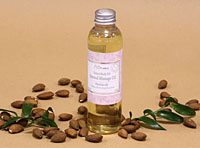Almond Oil in Aromatherapy
Almond Oil and Its Uses in Aromatherapy: A Factual Overview
Almond oil, derived from the seeds of the Prunus dulcis tree, is a popular ingredient in both skincare and aromatherapy. Known for its rich, emollient properties, almond oil has been used for centuries in various cultures. This article explores the origins, composition, benefits, and specific uses of almond oil in aromatherapy, providing a clear, fact-based understanding of its applications.
Origins and Types of Almond Oil
There are two main types of almond oil: sweet almond oil and bitter almond oil.
- Sweet Almond Oil:
- Derived from the edible seeds of the sweet almond variety (Prunus dulcis var. dulcis).
- Commonly used in cooking, cosmetics, and aromatherapy.
- Known for its mild, nutty aroma and pale yellow color.
- Bitter Almond Oil:
- Extracted from the bitter almond variety (Prunus dulcis var. amara).
- Contains amygdalin, which can produce cyanide, making it toxic in its raw form.
- Typically used in small, highly processed quantities in cosmetics and fragrances.
For aromatherapy, sweet almond oil is preferred due to its safety and beneficial properties.
Composition and Nutritional Profile
Sweet almond oil is rich in essential nutrients, including:
- Vitamins: Vitamin E (a powerful antioxidant), Vitamin A (retinol), and B vitamins (riboflavin, niacin, thiamine, pantothenic acid, folate, and vitamin B6).
- Fatty Acids: Oleic acid (monounsaturated fat), linoleic acid (polyunsaturated fat), and palmitic acid (saturated fat).
- Minerals: Magnesium, calcium, and zinc.
These components make almond oil an excellent carrier oil in aromatherapy, enhancing the absorption of essential oils into the skin.
Benefits of Almond Oil in Aromatherapy
- Moisturizing and Nourishing: Almond oil’s high vitamin E content helps to nourish and moisturize the skin, making it ideal for dry or sensitive skin types.
- Anti-inflammatory Properties: The fatty acids in almond oil can help to reduce inflammation, making it beneficial for conditions like eczema and psoriasis.
- Antioxidant Effects: Vitamin E provides antioxidant protection, helping to combat oxidative stress and free radical damage in the skin.
- Enhancing Relaxation: When used as a massage oil in aromatherapy, almond oil’s smooth texture and subtle aroma contribute to a calming and relaxing experience.
Specific Uses of Almond Oil in Aromatherapy
- Carrier Oil for Essential Oils:
- Almond oil is often used as a base or carrier oil to dilute essential oils in aromatherapy.
- It helps in the even distribution of essential oils and enhances their absorption without causing skin irritation.
- Massage Therapy:
- Its lightweight and non-greasy texture makes almond oil ideal for massages.
- It allows the hands to glide smoothly over the skin, reducing friction and providing a soothing experience.
- Skin Care Applications:
- Almond oil can be used to create customized aromatherapy blends for facial and body care.
- It is effective in treating dry skin, minor wounds, and sunburn.
- Hair Care:
- Incorporating almond oil into hair care routines can improve scalp health and add shine to the hair.
- It can be used as a base for essential oils aimed at promoting hair growth or treating dandruff.
Safety and Precautions
- Allergies: People with nut allergies should avoid using almond oil or perform a patch test before widespread application.
- Storage: Almond oil should be stored in a cool, dark place to prevent it from going rancid.
- Dilution: When using essential oils with almond oil, proper dilution (usually 1-2% essential oil in a carrier oil) is crucial to avoid skin irritation.
Almond oil, particularly sweet almond oil, is a versatile and beneficial component in aromatherapy. Its moisturizing, anti-inflammatory, and antioxidant properties make it an excellent carrier oil for essential oils, enhancing their therapeutic effects. Whether used for massage, skin care, or hair care, almond oil’s gentle nature and nutrient-rich profile make it a staple in aromatherapy practices. Always ensure proper use and consult with a healthcare professional if you have any concerns or allergies.
